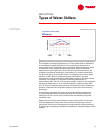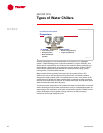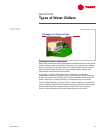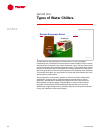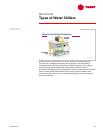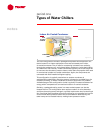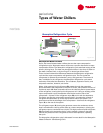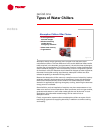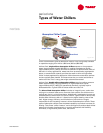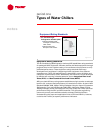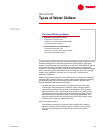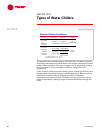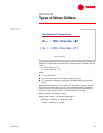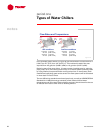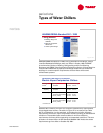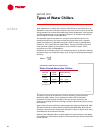
TRG-TRC016-EN 17
period one
Types of Water Chillers
notes
There are three basic types of absorption chillers. They are typically available
in capacities ranging from 100 to 1,600 tons [350 to 5,600 kW].
Indirect-fired, single-effect absorption chillers operate on low-pressure
steam (approximately 15 psig [205 kPa]) or medium-temperature liquids
(approximately 270°F [132°C]), and have a coefficient of performance (COP) of
0.6 to 0.8. In many applications, waste heat from process loads, cogeneration
plants, or excess boiler capacity provides the steam to drive a single-effect
chiller. In these applications, absorption chillers become conservation devices
and are typically base-loaded. This means that they run as the lead chiller to
make use of the “free” energy that might otherwise be wasted.
Indirect-fired, double-effect absorption chillers require medium-pressure
steam (approximately 115 psig [894 kPa]) or high-temperature liquids
(approximately 370°F [188°C]) to operate and, therefore, typically require
dedicated boilers. Typical COPs for these chillers are 0.9 to 1.2.
The direct-fired absorption chiller includes an integral burner, rather than
relying on an external heat source. Common fuels used to fire the burner are
natural gas, fuel oil, or liquid petroleum. Additionally, combination burners are
available that can switch from one fuel to another. Typical COPs for direct-fired,
double-effect chillers are 0.9 to 1.1 (based on the higher heating value of the
fuel). Higher energy efficiency and elimination of the boiler are largely
responsible for the increasing interest in direct-fired absorption chillers. These
types of absorption chillers have the added capability to produce hot water for
heating. Thus, these “chiller–heaters” can be configured to produce both chilled
water and hot water simultaneously. In certain applications this flexibility
eliminates, or significantly down-sizes, the boilers.
Absorption Chiller Types
single-effect
double-effect
direct-fired
Figure 20



